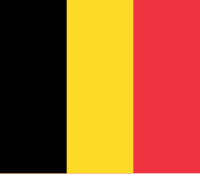List of Intangible Cultural Heritage elements in Belgium

The United Nations Educational, Scientific and Cultural Organisation (UNESCO) intangible cultural heritage elements are the non-physical traditions and practices performed by a people. As part of a country's cultural heritage, they include celebrations, festivals, performances, oral traditions, music, and the making of handicrafts.[1] The "intangible cultural heritage" is defined by the Convention for the Safeguarding of Intangible Cultural Heritage, drafted in 2003[2] and took effect in 2006.[3] Inscription of new heritage elements on the UNESCO Intangible Cultural Heritage Lists is determined by the Intergovernmental Committee for the Safeguarding of Intangible Cultural Heritage, an organisation established by the convention.[4]
Belgium ratified the convention on 24 March 2006.
Intangible Cultural Heritage elements[edit]
Representative List[edit]
| Name | Image | Year | No. | Description |
|---|---|---|---|---|
| Carnival of Binche | 
|
2008 | 00033 | The Carnival of Binche is an annual festival held in Binche during the Sunday, Monday, and Tuesday preceding Ash Wednesday. |
| Processional giants and dragons in Belgium and France +[a] | 
|
2008 | 00153 | The processional giants and dragons of Belgium and France are a set of folkloric manifestations involving processional giants and dragons. |
| Procession of the Holy Blood in Bruges | 
|
2009 | 00263 | The Procession of the Holy Blood is a religious Catholic procession which takes place each Ascension Day in Bruges. |
| Krakelingen and Tonnekensbrand, end-of-winter bread and fire feast at Geraardsbergen | 
|
2010 | 00401 | Krakelingen and Tonnekensbrand are the names of annual centuries-old festivities in Geraardsbergen. |
| Houtem Jaarmarkt, annual winter fair and livestock market at Sint-Lievens-Houtem | 
|
2010 | 00403 | Each November, Sint-Lievens-Houtem holds a winter fair and livestock market, the Houtem Jaarmarkt, where hundreds of traders sell cattle and horses. |
| Leuven age set ritual repertoire | 2011 | 00404 | The Leuven age set ritual is a tradition of men from Leuven born the same year. | |
| Marches of Entre-Sambre-et-Meuse | 
|
2012 | 00670 | The Marches of Entre-Sambre-et-Meuse are a set of folk marches, taking place from May to October in Entre-Sambre-et-Meuse. |
| Shrimp fishing on horseback in Oostduinkerke | 
|
2013 | 00673 | Shrimp fishing on horseback in Oostduinkerke. |
| Beer culture in Belgium | 
|
2016 | 01062 | Beer in Belgium includes pale ales, lambics, Flemish red ales, sour brown ales, strong ales and stouts. |
| Ommegang of Brussels, an annual historical procession and popular festival | 
|
2019 | 01366 | The Ommegang of Brussels is a traditional Ommegang, a type of medieval pageant, celebrated annually in Brussels. |
| Musical art of horn players, an instrumental technique linked to singing, breath control, vibrato, resonance of place and conviviality +[b] | 
|
2020 | 01581 | |
| Namur stilt jousting | 
|
2021 | 01590 | Stilt jousting is a 600-year-old tradition of Namur, in which costumed people on stilts joust. |
| Falconry, a living human heritage +[c] | 
|
2021 | 01708 | The origin of falconry goes back to the use of hunting by birds of prey as a mean of hunting but it has evolved over time to become part of the cultural heritage of the people. |
| Traditional irrigation: knowledge, technique, and organization +[d] | 
|
2023 | 01979 |
Good Safeguarding Practices[edit]
| Name | Year | No. | Description |
|---|---|---|---|
| Programme of cultivating ludodiversity: safeguarding traditional games in Flanders | 2011 | 00513 | |
| Safeguarding the carillon culture: preservation, transmission, exchange and awareness-raising | 2014 | 01017 | |
| Tocatì, a shared programme for the safeguarding of traditional games and sports +[e] | 2022 | 01709 | |
| Safeguarding foster care heritage in the merciful city of Geel: a community-based care model | 2023 | 00622 |
See also[edit]
Notes[edit]
- ^ Shared with France.
- ^ Shared with France, Luxembourg, and Italy.
- ^ Shared with Austria, Croatia, Czechia, France, Germany, Hungary, Ireland, Italy, Kazakhstan, Kyrgyzstan, Mongolia, Morocco, Netherlands, Pakistan, Poland, Portugal, Qatar, Saudi Arabia, Slovakia, South Korea, Spain, Syria, and the United Arab Emirates.
- ^ Shared with Austria, Germany, Italy, Luxembourg, Netherlands, and Switzerland.
- ^ Shared with Croatia, Cyprus, France, and Italy.
References[edit]
- ^ "What is Intangible Cultural Heritage?". UNESCO Intangible Cultural Heritage. Retrieved 13 January 2024.
- ^ "Text of the Convention for the Safeguarding of Intangible Cultural Heritage". UNESCO Intangible Cultural Heritage. Retrieved 13 January 2024.
- ^ "The States Parties to the Convention for the Safeguarding of the Intangible Cultural Heritage (2003)". UNESCO Intangible Cultural Heritage. Retrieved 13 January 2024.
- ^ "Functions of the Intergovernmental Committee for the Safeguarding of Intangible Cultural Heritage". UNESCO Intangible Cultural Heritage. Retrieved 13 January 2024.
External links[edit]
- UNESCO Intangible Cultural Heritage: Official site
- UNESCO Intangible Cultural Heritage in Belgium: Official site


